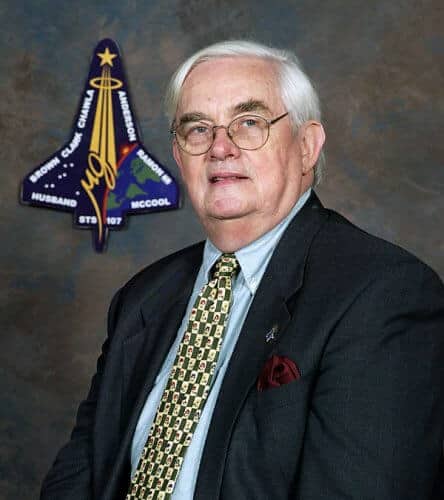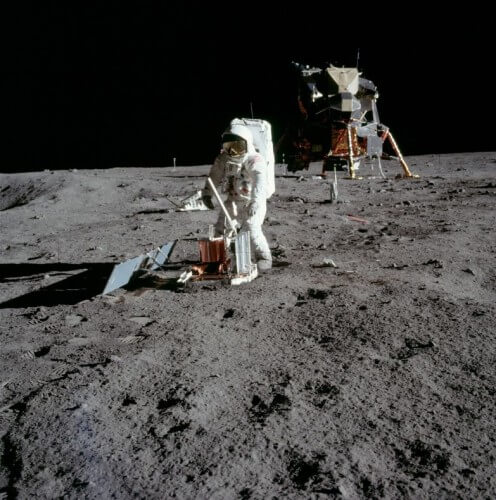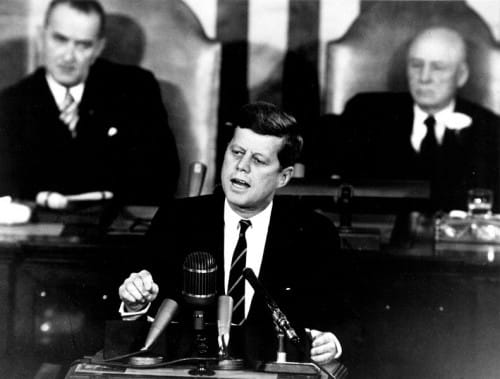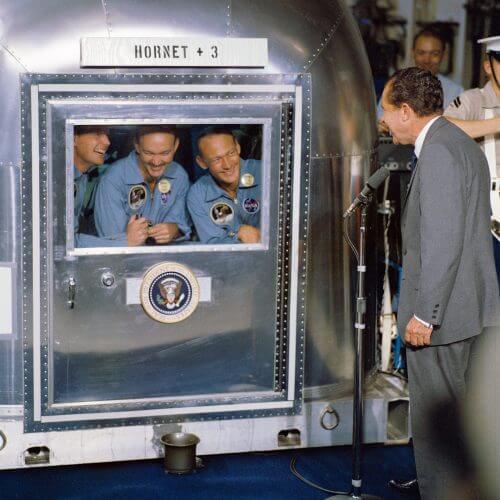This is what John Logsdon, professor emeritus in the political science department at George Washington University and a member of the International Space University faculty, says in an interview with the Al-Hadamin site, in which he also briefly answers a question about his opinion on the Mars One program

When Apollo 17 left the moon for the last time in December 1972, it was the then US president, Richard Nixon, who said, knowingly, that this was the last time in the foreseeable future that humans would fly outside of low Earth orbit. Says John Logsdon, a professor at George Washington University and a member of the faculty of the International Space University whose summer course is held at the Technion. Lonsdon was also a member of the Commission of Inquiry into the Columbia disaster.
Longdon is the author of the 2010 books John F. Kennedy and the Race to the Moon and After Apolo?: Richard Nixon and the American Space Program, published in 2015. Longdon spoke on the subject at an event held last week at Church Auditorium Yale at the Technion and was interviewed by the site Hedaan.
The decision to do so was made a year earlier, in the shadow of the near-disaster of Apollo 13, when NASA also feared another disaster and agreed to cancel the last two flights and reorganize the crews of the remaining flights.
This brought to an end a period that began with President Kennedy's 1961 speech to send an astronaut to the moon "by the end of the decade" which was fulfilled on July 20, 1969.

"The decisions made between 1961 and 1972 by Presidents John F. Kennedy and Richard Nixon defined the manned space program for over half a century." Logsdon said in an interview with the science website.
"None of the presidents since then - Ford, Carter, Reagan, Bush Sr., Clinton and Bush Jr. - had a similar or even close influence. Between Kennedy and Nixon, it was Nixon who had the greater impact. President Barack Obama's decision in 2010 to challenge NASA to land a man on Mars will have to wait for the decision of the next president. Only then can we say that we have left the Nixon era."
According to him, the difference between President Obama and his predecessors is that today we are developing the heavy launcher and the manned spacecraft (Orion), so the next president will not start from scratch.
"Kennedy was not a visionary in terms of the impact of the moon flight on the future of space exploration, and he did not justify Apollo in terms of scientific returns. Instead, he was a pragmatic leader who came to the decision that the national and international interests of the United States required that the United States be a leader in space capabilities and achievements there. He chose the moon landing as a way to demonstrate these capabilities."
"The debates within the top of the administration over the nature of the space program continued until the sudden assassination of President Kennedy. He dealt with the issue almost until his last day, and was criticized by consultants who asked to cut back or at least increase the program in order to spread its cost over several years. Apparently, Kennedy was close to such a decision, but after his death, the plan became an operation in his memory, and his vice president, Lyndon Johnson, who became president and was also elected for a second term, decided not to intervene, and the decision passed to his successor - Richard Nixon.

In 1971, when the Apollo operation was in full swing, Nixon made the decisions that, as mentioned, accompany the space program to this day:
- To treat the space program not as a special high-priority government program, as was the case during the Apollo operation, but as part of the government's day-to-day activities, when its budget will be determined within the RIGIROUS system of the national priority order.
- To lower the ambitions of the USA in space by not setting another space challenge and ending for the foreseeable future the ability to launch humans outside the Earth's orbit.
• Build a post-Apollo program around the space shuttle without linking the shuttle to a long-term strategy for its applications, except for ideas for launching and assembling components of a space station.
These decisions, as mentioned, defined the US manned space programs for over 40 years.
"After the US achieved the goal that Kennedy had set, President Nixon announced that the US had won the race and there was no point in continuing it. Nixon wanted to lower the order of space priorities, both he and NASA were looking for what to do with the heavy equipment - launchers and cells, which gave birth to the Apollo-Soyuz operation and the Skylab space station."
"Since 1972, everyone - including the USA - has been limited to a low Earth orbit (LEO) of about 400 kilometers and we have not continued beyond that. Now President Obama has said we should go to Mars, we'll see if the next president agrees with that or not. This is the biggest space question as far as manned flights are concerned.

The budget plan talks about spending about 200 billion dollars in a spread of 6-7 billion dollars per year, just as the annual maintenance of the space shuttles and the space station cost together. Today we have stopped paying the shuttle's mortgage, but we still have a mortgage of 3 billion dollars per year, until it is decided to end the International Space Station project, which has been extended in the meantime until the year 2020. This is much less than the costs of the Apollo program because we are not chasing anyone and therefore we can succeed. If the US invests in Mars as in the space station, it will be able to do it and like the space station it will be required to do it together with others.
Why did Obama decide to give up the moon and order the preparation of a flight to Mars?
"Obama said we will not go back to the moon because Bush said we will go back to the moon and go on to Mars and Obama wanted to be different. But the rest of the world is interested in the moon, and the US is developing a large rocket and a spacecraft - two thirds of what is needed to reach the moon. If another country develops a lunar lander, we can use these tools to also explore the moon on the way to Mars."
What do you think of the proposal of the head of the European Space Agency Johann Dietrich Werner to build an international village on the moon?
"I think the idea of the European Space Agency is very interesting, it's a counter way to the US focus on Mars, we may end up with a synthesis of European leadership on the moon and American leadership on Mars. The problem is that Europe does not have the money to do this. China and Russia are not in a hurry to get to the moon either, I still think the only way for humanity to return to the moon is for the US to have a big role in the operation."
Can't the private market fill the place of governments, after all there are companies like Spice X?
"According to the current plan, the flight to Mars will take place by the end of the XNUMXs. Elon Musk is going to announce in September that he plans to use the heavy launcher and the company's spacecraft to reach Mars by the mid-XNUMXs. I hope he succeeds, but this is a huge expense that requires considerable government funding. Mr. Musk thinks he will be able to do this as the show's leader. It's a question of money."
What do you think about the Mars One program?
Mars One is a scam.
What is the position of Trump and Hillary Clinton on the issue of space?
Longson: "They didn't clarify their position and probably won't either. If they are asked what their space vision is, they will say that they will learn the subject when they get to the White House. The issue is not an important issue in the current election system from the point of view that no one will be elected because of their position on the issue."
More of the topic in Hayadan:
- 47 years since the moon landing - the technologies that got us there
- Buzz Aldrin at the space conference in Jerusalem: I do not support a one-time flight to Mars but the establishment of a permanent colony
- The US returns to deep space - a successful test flight for the Orion spacecraft
- A private company (Mars One) wants to send four people to Mars in 2023, in one direction

8 תגובות
I guess you can get the information. The Europeans led a probe that landed on an asteroid called Philae.
The Americans arrived with probes to Mars and the very distant Pluto.
The Chinese, Indians have active plans for a reusable shuttle. Traveling to Mars includes a huge cluster of new needs. Investment in them, in my opinion, tens of billions of dollars. How to move with a source of propulsion that does not increase depending on the distance to the destination, how to exist in space with food sources sufficient for years, repair in space, breathing, survival on Mars, return to Earth. I understand that we as a culture have a problem overcoming differences and acting together. This is what is required.
"Shamer" is missing. already fixed.
She asked Yossi at what height is the Banelaotian space station Avi
If Obama was mainly concerned with getting out of Iraq, saving the financial and automobile sectors. The next president/s could turn to the issue of space - a pragmatic Hillary will probably promote the return to the moon. Trump the megalomaniac will aim for Mars while bankrupting America (as he is used to doing his business)
indeed. It seems that the privatization. Elon alone cannot raise a journey to Mars. That's why I said a corporation of 20 countries - can try.
It's pretty clear that Hillary Clinton has no business in space. I am not very optimistic about Trump. It seems to me that Trump will be more busy building a wall between Earth and Mexico and preventing an alien invasion from there. Best Control The US space program will continue to send robotic spacecraft to the elements of the solar system every few years. Regarding the European Union, nothing can be expected. If they try really hard they might build an Olympic village on the moon around 2040.
In short, it seems that the field remains open for Elon Musk and the guys.
The last article about Mars on the site was January 2016. Shows how little activity is being done. Average leaders like not to decide which means to decide not to. Strengthens the feeling that: only a global association that includes the Union and the USA and Japan. Spread the travel costs and you will succeed. The price is that the USA will not boast. I have a bigger one. What to do their income level has decreased. Alternatively, privatize the space industry. The production of economic dictators who are not subject to any democratic process. As in the Sand Duke series Leto Atreides. or the baron.
"When Apollo 17 left the moon for the last time in December 1972. It was the then US president, Richard Nixon, which is the last time in the foreseeable future that humans flew outside low Earth orbit"
Something is wrong with this sentence.